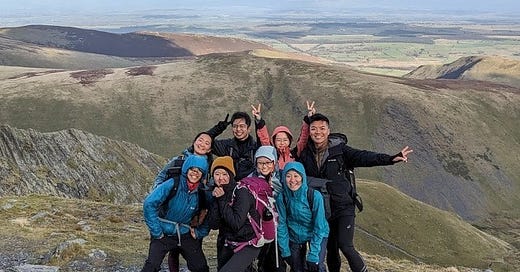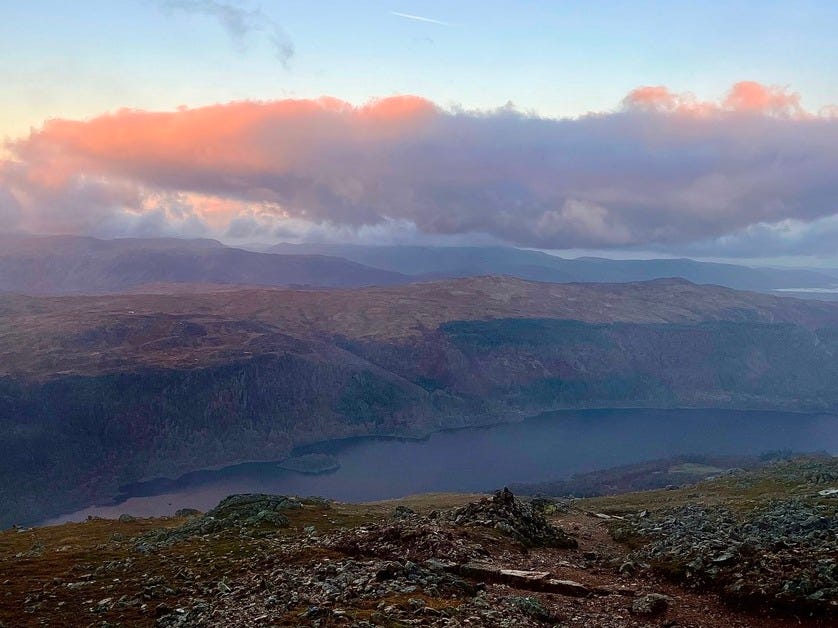Fear and Belonging In The Mountains
On overcoming a fear of scrambling, finding belonging, and the importance of community groups
I’ve been to the Lakes multiple times, but you know when there’s that one trip that remains memorable for the feelings it evoked?
Last October, I was lucky enough to spend a few days in the Lakes with a group from East Southeast Asia (ESEA) Outdoors. This was made possible through funding from the Lake District Foundation.
Over three days, we planned a series of hikes. On the first day, a group of us went up Helvellyn via Striding Edge. On the second day, we went up Blencathra via Sharp Edge. On the third, a group of us even conjured an idea to do a sunrise summit up Helvellyn, something normal to some, but crazy to us — for many it was a first, of many who didn’t grow up in the outdoors.
Overcoming My Fear of Scrambling
Completing Striding Edge and Sharp Edge was a first for me. The sense of satisfaction that coursed through at the peak was unforgettable. This was because it was my first time scrambling in 1.5 years, after a near-death experience on the Glyders. Ever since that, I’d struggle with flashbacks of the accident on any terrain that vaguely resembled scrambling. I also developed a sense of inferiority and harboured the inherent fear of holding others back or burdening them. This made me shy away from doing ‘big days’, for fear of ‘falling behind’.
And so being able to do two classic knife-edge ridges back-to-back — was something I a few months ago wouldn’t have imagined was possible. But in hindsight, it was only possible because of the people I was surrounded by. Simple comments of ‘take your time, don’t rush it’, can go a long way for someone struggling with self-confidence on the mountains. It was that reassurance for someone who didn’t grow up in the outdoors, and the overt camaraderie, something special to share with people I had just met.
On Belonging
At the end of every day, we would gather back in the barn and cook in small groups for one another. The kitchen was bursting with flavours representing a multitude of cuisines, from katsu curry to Udon noodles. The last night was extra special, as we gathered around the table and sang songs of all cultures. There was just something comforting about being surrounded by people who shared similar cultures even if everyone hailed from different backgrounds. It was a warm fuzzy feeling of community and belonging — a feeling I hadn’t felt in years, and a feeling I held onto tightly.
I spent a bulk of 2024 grappling with my identity — of who I was, and the dichotomy between my roots and the things I stood (and still stand) for. Of trying to fit into places and feeling out of place. But throughout the weekend, I could finally stop searching — to stop thinking I was the problem. That there was somewhere I could finally let my guard down, somewhere I belonged. That I didn’t have to mould myself into places that didn’t have a space.
Integration or Isolation?
Arguably, the trip was organised and funded as part of efforts to increase diversity and accessibility in the outdoors. It is a well-recorded and documented fact that people from ethnic minority backgrounds face multifaceted structural and psychological barriers to accessing the outdoors. This has fuelled the creation of many community groups targeted at people from underrepresented backgrounds. From ESEA Outdoors, to Muslim Hikers, to ColourUp Bristol and Wanderers of Colour.
Sometimes backlash happens, where detractors of such initiatives argue that they perpetuate segregation or promote “racism”. I’ve also had a couple of friends throw me the same question of integration versus isolation — is the aim not to get everyone to interact with one another together in a space like the outdoors that is meant for ‘all’? Does organising initiatives for a specific demographic of people not inherently exclude others?
Understandably so. But if you’ve faced years of casual racism or grown up with your parents preparing you for the systems that will be against you, it’s difficult to imagine a world that welcomes you. These lead to deep-seated psychological barriers that keep people away from spaces that feel uninviting from the get-go.
I’ve been privileged enough to come from a country where I was part of the majority race. That background of empowerment has made it easier for me to try something new, to venture into the outdoors. And yet I still struggle to find my footing. I think about my friends who lack these privileges, and how much more daunting that first step must be.
And so, community groups exist to create safe spaces. They exist to support people in accessing the outdoors. They exist to rebel. To challenge the status quo. To dream of a world where people irrespective of backgrounds can interact with one another free of prejudice.
And one day, may people of colour feel empowered enough to step out into the hills — alone and assured, wild and free, like the echoes of Mother Nature.






💛💛